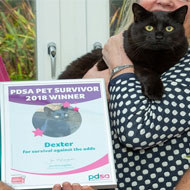
PDSA Pet Survivor of the Year crowns Cornwall cat
Dexter, a two-year-old cat from Cornwall, has been honoured with the PDSA Pet Survivor of the Year award after winning a national vote.
Dexter was intentionally shot by an airgun in July 2018, leaving his jaw fractured, an exit wound in the back of his neck and substantial leg injuries.
His head was scattered with metal shrapnel and, upon first presentation, was not expected to survive the appalling act of cruelty.
Initial treatment included having a fixator attached to his jaw that stayed in place for five weeks and involved his owners hand-feeding him several times a day. It was uncertain if Dexter would regain full use of his legs, but, with the dedication of the veterinary team and his owners, he slowly began to walk again.
A hole remained in Dexter’s mouth where the pellet had penetrated, leaving it open to his nasal passages. Further surgery was then scheduled at a specialist centre to have a ‘transposition flap’ of healthy tissue positioned to close off the hole. After being tube fed for two weeks, Dexter is now expected to make a full recovery.
Speaking of the award, Ruth Lewis, Dexter’s owner, commented: “I entered Dexter in the competition thinking it would be a nice way to recognise his incredible bravery, but I never expected him to win!
“it’s been a terrifying ordeal for all of us, we’re still recovering emotionally from what happened, but Dexter’s patient determination has been an inspiration. We’re amazed at how well he’s healed and recovered.
“Thanks so much to our vets, and to PDSA for recognising our little miracle cat like this.”
PDSA Senior Vet Sean Wensley said: “After an uncertain start in life Dexter found a loving home, only to suffer at the hands of those who mindlessly inflict harm on people’s pets. It is thanks to the skill and dedication of veterinary professionals that Dexter’s fortunes are, once again, turned around.”
Image (c) PDSA



 The Veterinary Medicines Directorate (VMD) is inviting applications from veterinary students to attend a one-week extramural studies (EMS) placement in July 2026.
The Veterinary Medicines Directorate (VMD) is inviting applications from veterinary students to attend a one-week extramural studies (EMS) placement in July 2026.